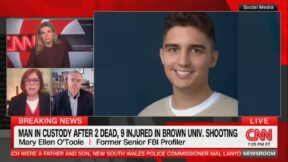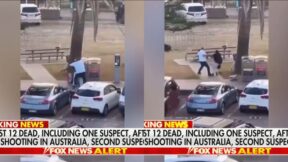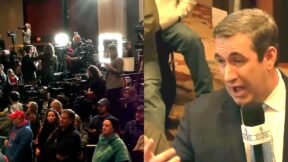WATCH: Parade of Cable News Experts Insist FBI Mar-a-Lago Raid Was ‘Not a Raid’
Ever since the FBI raided former President Donald Trump‘s Mar-a-Lago resort home, cable news experts have been tripping over themselves to insist that the raid was “not a raid.”
Here’s where things stand: Monday’s raid on Trump’s Florida residence has shaken up the political landscape and dominated a news media hungry for details. Amid a public campaign to baselessly smear the FBI over the search, Trump has reportedly embarked on a private campaign to learn who is talking to authorities.
Two Trump lawyers who were on the scene during the search — Christina Bobb and Lindsey Halligan — have said that the warrant they were shown was partly sealed, and Trump has thus far declined to release it. But according to bombshell leaks from government officials to Newsweek’s William Arkin, the search was the result of a “confidential human source.”
The raid has also created a lot of violent chatter and other threats from Trump supporters — and from elected Republicans.
And due to a combination of factors, the non-Fox News cable stations have taken to hosting experts who insist the raid was not a raid, and some of their on-air personalities have adopted the posture.
It seems to have begun on Monday night’s edition of MSNBC’s The Last Word with Lawrence O’Donnell, with MSNBC legal analyst Andrew Weissman, a former AUSA — a crucial bit of context.
Weissman objected to the terminology, and made a distinction that would become characteristic of this phenomenon:
It’s very important to remember this was not a break-in. This was not a raid. This wasn’t the attorney general of the United States deciding willy-nilly on his own that he was going to do this search. A court had to approve this search here based on, as you pointed out, Lawrence, evidence.
He was the first, but certainly not the last. The next hour, 11th Hour host Stephanie Ruhle referred to Weissmann’s earlier note, and asked MSNBC analyst Frank Figliuzzi, a former assistant director for counterintelligence at the FBI, to explain why the search was “not a raid”:
STEPHANIE RUHLE: Frank, I want you to pull on another thread that Andrew started for us. This was not a raid. We should not think of this as the FBI in the middle of the night, banging down the door with someone answering in their boxer shorts. Explain to us what today would have looked like, because it’s definitely being mischaracterized by a lot of folks out there.
FRANK FIGLIUZZI: Well, it is, even as we speak. And far-right platforms are just in a frenzy over this. And even the former president used the term “unannounced.” Well, let me explain something. Never in my 25-year FBI career did we call a subject and say, “you know, is it okay with you if we stop by about 8 a.m. for coffee? Is that going to be convenient for you? Because we’ve got a search warrant we’re going to lay on you because we think you’re hiding stuff.” That doesn’t work that way. What we’re hearing through NBC News reporting is that just before the search warrant execution, the FBI called the Secret Service, gave them a heads up saying we’re going to be coming on there with a court-ordered search warrant. We’re going to be armed. We would ask you to help out, just point us toward the direction, but just know where we’re there. Secondly, we heard from NBC News that it was plainclothes agents who show up. So they’re not trying to make a spectacle of it. With regard to breaking into a safe. Yes. Don’t don’t know if force was used or not. There are various techniques and tools that the FBI has available to them.
This talking point has been repeated at least a dozen times since Monday on MSNBC and CNN, and while each of these experts delivers an accurate description of the not-a-raid — the execution of a search, without warning, using a lawfully-obtained search warrant from a judge based on evidence — that description is also literally the dictionary definition of a “raid.”
Here are a few of those definitions:
- “A police raid is an unexpected visit by police or other law-enforcement officers with the aim of using the element of surprise in order to seize evidence or arrest suspects believed to be likely to hide evidence, resist arrest, be politically sensitive, or simply be elsewhere during the day.” — Wikipedia
- “(of the police) to enter a place suddenly in order to find someone or something:
Police officers from the organized crime division have raided businesses in central London.” — Cambridge dictionary. - “The term ‘raid,’ for law enforcement purposes, is defined as a sudden appearance by officers for the purpose of arresting suspected law violators and seizing contraband and the means and instruments used in the commission of a crime.” — RAIDS AND SEARCHES New Agent Training, Justice Department
In fact, in countless press releases, the FBI itself uses the term “raid” to describe circumstances such as these. There are also dictionary definitions of law enforcement raids that include the use of force, but that’s not an inherent part of the definition — and since agents are always armed, there is an element of force. Nothing about any of these definitions implies illegality or the capricious abuse of power or the absence of evidence or probable cause.
Fox News has picked up on the “not a raid” phenomenon and cast it as an effort to contradict Trump, and they’re not entirely wrong about that. One main reason experts and personalities on CNN and MSNBC are saying this appears to be that Trump called it a raid WHILE he was baselessly smearing the FBI by accusing them of planting evidence.
But that’s not what “raid” means. It should be fairly simple to push back on those connotations without making the absurd assertion that a raid is not a raid.
Another element, though, is that to a person, the ones pushing this idea are all former law enforcement officials who just don’t like the term anyway. For example, here’s an official from the Border Patrol union — Brandon Judd — pushing back on the term in 2019 during the Trump administration — on Fox & Friends:
GRIFF JENKINS: Brandon, give us some insight, because if these raids do indeed come and we expect, then it’s about 2000 people across ten states. Who is it that they are going to apprehend?
BRANDON JUDD: So these individuals have come here illegally in the first place. They’ve claimed asylum or they asked for some sort of amnesty in this country. They went through their court proceedings. They were denied that amnesty, which, in other words, they were not able to prove that they should be able to remain here in the United States. They they exhausted their due process. And those are the individuals that we’re going after. This is not a raid, where we’re going out into the streets and grabbing anybody that we can. We’re specifically targeting those individuals that have defied an order of deportation by a judge here in the United States.
The media is right to push back on the notion that the FBI search was extrajudicial or abusive — absent any evidence of this — but they should do it by explaining what a raid is and is not, not by denying that what clearly was a raid… was a raid.
Watch above via MSNBC and CNN.




